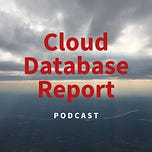Hi everyone! This is an update to my recent blog post on the final days of the legacy data warehouse (link below).
The topic of legacy data warehouses slowly fading away struck a chord with many readers. Now we have updates from Snowflake and Teradata.
On Aug 24, the same day I published “The Final Days of the Legacy Data Warehouse,” Snowflake announced its earnings for Q2 FY2023. Not surprisingly, a question about legacy systems came up during Snowflake’s earnings call. One financial analyst asked Snowflake CEO Frank Slootman about the level of activity of customers migrating from on-premises systems to Snowflake’s data cloud.
Slootman: “In the last week, I've heard two very, very iconic names in two different industries that were staunch on-premises people, who would never ever go cloud, and that are now going [cloud]. So I just feel that the resistance is completely breaking….A lot of this is that they’re going to get left behind. You can’t take advantage of innovations that are only available on the cloud. We’re going to see acceleration out of this.”
Is he right? I have no doubt that he is.
According to Ocient, 59% of respondents to its survey are actively looking to switch data warehouse providers. They specifically named IBM, Cloudera, and Teradata as the top 3 legacy environments that data managers want to move away from.
Their reasons:
· 40% want to modernize their legacy platforms
· 42% feel their existing system isn’t comprehensive enough, and
· 36% say it’s not flexible enough
This explains why Snowflake, with its data cloud and data marketplace, has become such a tour de force. Other disruptors are Databricks, Firebolt, SingleStore, TileDB, Yellowbrick, and of course AWS, Google, and Microsoft.
I would include Ocient as well, with its hyperscale data warehouse platform, which is capable of analyzing trillions of records.
The old guard responds
Where does that leave traditional data warehouse providers—companies like IBM and Teradata? They know that their customers want newer, cloud-native platforms. And they’re taking steps to modernize their offerings.
That brings me back to Teradata, which recently made a product announcement that is relevant to this whole discussion.
Teradata is synonymous with the older data warehouses that many organizations are looking to replace. But Teradata is fighting back, as SVP Ashish Yajnik described to me in an earlier Cloud Database Report podcast conversation (link below).
Teradata’s new cloud-native architecture
Now, Teradata has just introduced VantageCloud Lake, a new and improved cloud data warehouse that is based on a cloud-native architecture. With modern capabilities like object storage in the cloud, auto scaling, and self-service in AWS, and soon to be available in other clouds.
So the decision to move to a cloud data warehouse is getting easier, but also harder in some respects.
Easier because that’s the inevitable direction the industry is heading. For CIOs and CTOs the question is when, not if.
Harder because incumbent vendors like Teradata are not standing by while Snowflake and Databricks pick off their installed base. They’re responding with cloud-native platforms of their own.
Who will be the next leaders in this fast-changing market? We’ll have to wait a while longer for the query results on that question.












